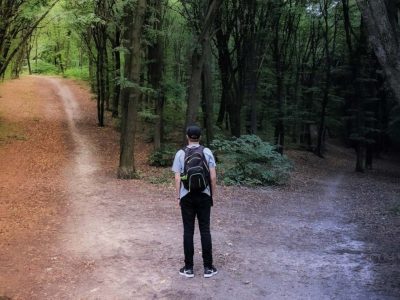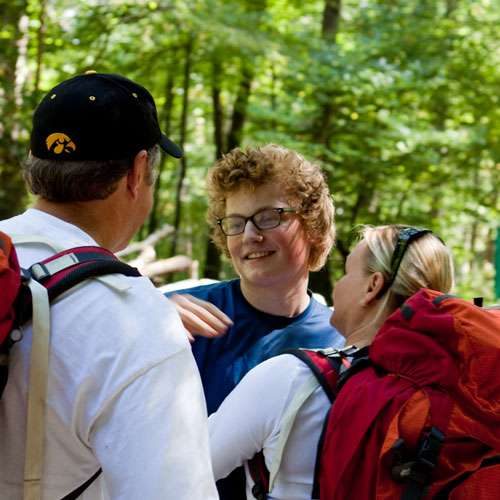Parents of Trails students often convey that video games are becoming a concerning problem in their children’s lives. Often, it’s gotten to the point that the games are more important than the relationships within the family. This is echoed by what we’re seeing in clinical discourse overall. We’ve seen many similarities between an individual’s addiction to video games and addiction to substance use, gambling addiction, pornography, and other addictive behaviors.
Wilderness therapy is an abstinence model meaning there are no phones or technology whatsoever. Basically every student I’ve ever worked with struggles with that in the beginning. They’re so used to having their phone or using video games as a distraction and means to avoid issues they are facing in their current life. It’s certainly a challenge, and I really see it as an opportunity for students to develop awareness and insight into what their relationship with technology was like before Trails and figure out ways while they are at Trails of getting those same needs met in non-technology ways.
Universal Needs: How To Get Them Met the Healthy Way
Oftentimes students that I work with are on the Autism Spectrum or have other Neurodevelopmental differences and struggle to diversify the ways in which they get their needs met. These “needs” can include the need to feel significant, the need to feel connected to someone else, to feel like they are contributing to something bigger than themselves, and having a sense of variety in their day. One way that I conceptualize this process for families is that playing video games for students is a way that they get many of their different universal needs met all at once.
When a student comes to Trails, they no longer have something technology-related that they can do to meet their different needs. This can be overwhelming and a lot of students struggle with how to navigate getting their needs met like they were before. Over time, due to the structure of the program, we set students up with ample opportunities to try new things and experience success. We give students opportunities to contribute to the group, develop connection through meaningful relationships, have variety in their daily schedule, and achieve tasks previously thought to be impossible. Our model welcomes students’ to a different way of living. Students learn that not only are there so many (other) opportunities but that they really have the power and the ability to engage in those different options and do those things well.
Trails’ programmatic therapeutic approach draws from a variety of mindfulness-based practices in efforts to help students increase their own emotional awareness. One way to increase emotional awareness is through the use of “I feel” statements. We want to encourage students to be more mindful and learn how to cope with their emotions in a healthy way. The use of different mindfulness-based techniques help them get out of their head and more into the moment. Whether we are observing nature, taking some space from the group and reflecting, or just taking a moment to consider how we’re feeling, we can all benefit from practicing mindfulness throughout our day instead of relying on phone or a video game as a way to avoid or dissociate from our own emotional experience.
Letter Writing Helps Build Communication Skills without Technology
At Trails, we utilize letter writing each week as a way for students to communicate with their parents back home. Letter writing provides an incredible opportunity to learn more about communication styles and how someone processes information. Particularly for the students that I work with who struggle with social pragmatics, letter writing is a really concrete way to teach things like emotional reciprocity, perspective taking, initiating conversations, and the nuts and bolts of having a conversation with another person.
Teaching students communication skills using non-technological means helps them learn to connect outside of those mediums. Many students rely on texting or social media to communicate with their friends and family, so teaching them the ins and outs of human interaction without a screen is vital to their long-term success.
With an over-reliance on technology, adolescents often struggle with appropriately communicating their needs. Many of their relationships are built and maintained online and so students struggle to connect in other contexts without the safety net of a screen. Through activities like letter writing, students learn how to communicate effectively and alleviate their anxiety around traditional communication methods. They feel empowered in their ability to talk through their issues when they learn the language to do so.
Something that I think about a lot as a wilderness therapist is that every student I work with is doing the best they can with the tools that they have. What we’re really striving to do is take stock of what tools the student already has and strengthen a student’s understanding of those tools through developing awareness and insight. Then teach them new tools and sharpen some old tools that they have so they are more equipped and more confident in their abilities to manage their emotions better and in doing so, have a better relationship with their parents and their siblings back home.
Trails Carolina Can Help
If your son or daughter is struggling with an over-reliance on technology, Trails Carolina’s wilderness therapy programs are effective for teenage gaming addiction help. We help students ages 10-17 overcome their addiction to video games, phones, or the internet with our clinical model. Students learn how to cope with their challenges in a healthy way and connect with other people to build positive relationships. If you think Trails Carolina might be the right fit for your family, contact us today at (800) 975-7303.
Get started today
Contact us today to learn how Trails Carolina can help your family
Trails saved my daughter’s life. Amanda is an amazing human and a brilliant therapist. I am so grateful to her, Science Steve, and the other wonderful people who could reach my daughter at a time when I could not.
Margot Lowman August 2022
Great life changing experience for our son. After becoming addicted to gaming during covid he was very depressed. At Trails he experienced the wilderness, Science Steve, learning survival skills and top notch therapy and support etc… I highly recommend! This gave our son and our family a renewed family bond full of love and excitement about his bright future.
Winnifred Wilson July 2022
Outstanding clinical work and superb staff! There’s a great culture at this company and it shows with how they engage with families/clients.
Kristin Brace June 2022
Discover If Trails Is The Right Program For Your Child
Take our short online assessment and help us better understand how we can help your family.




